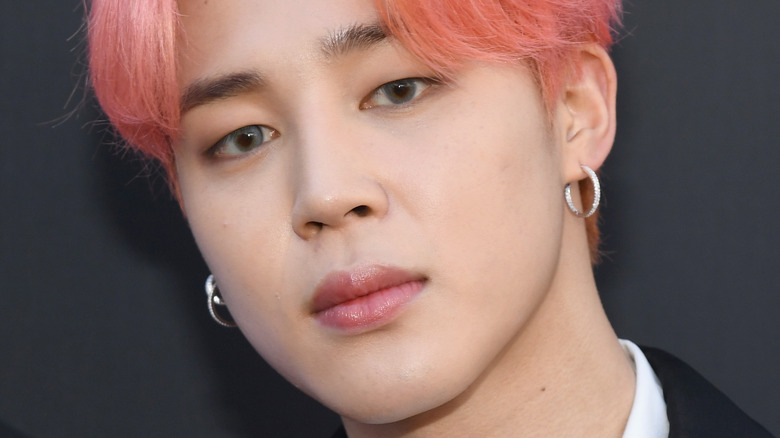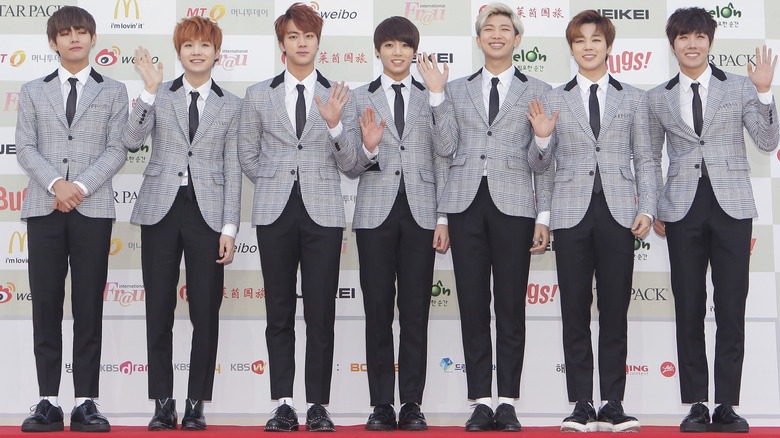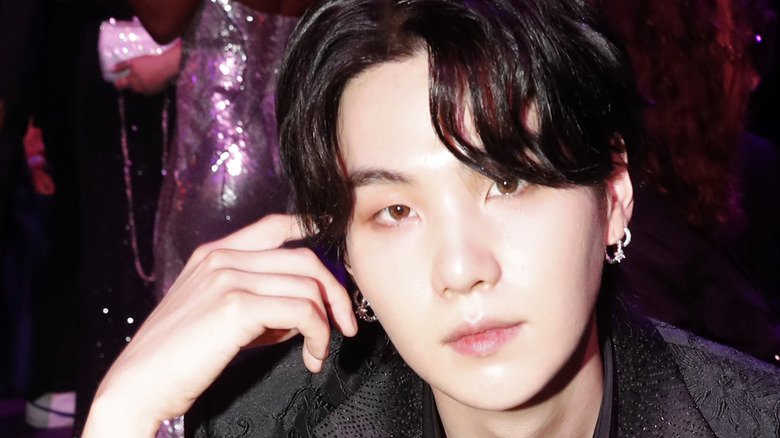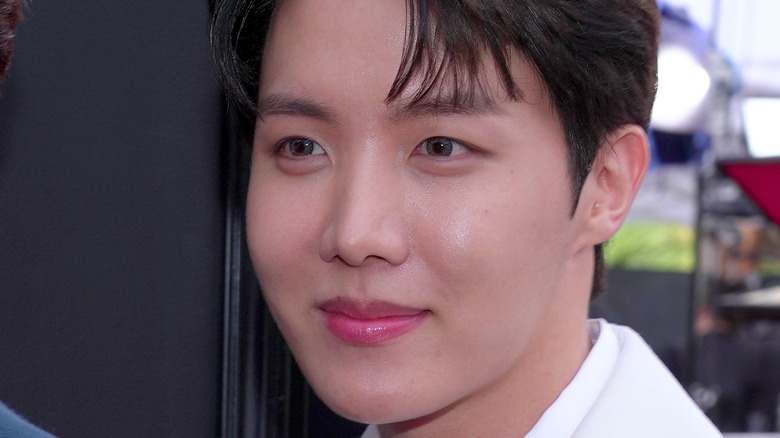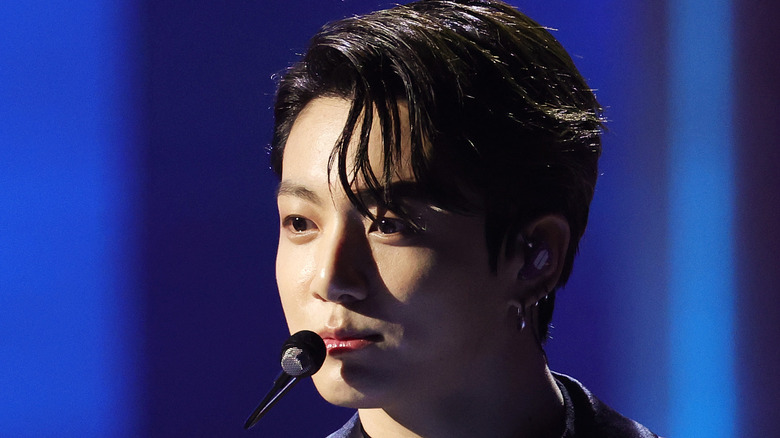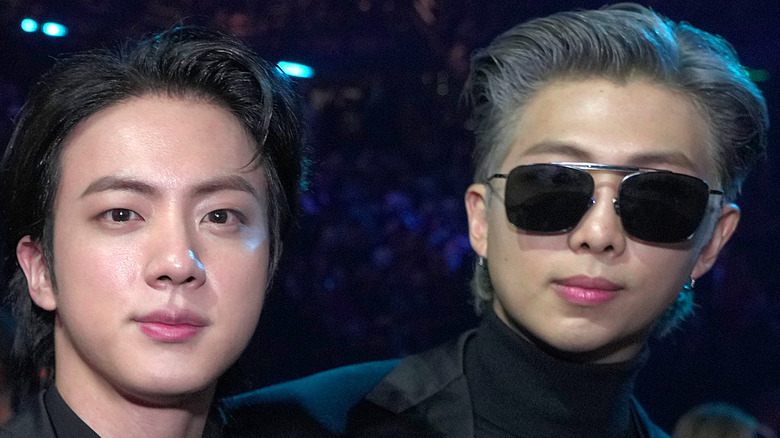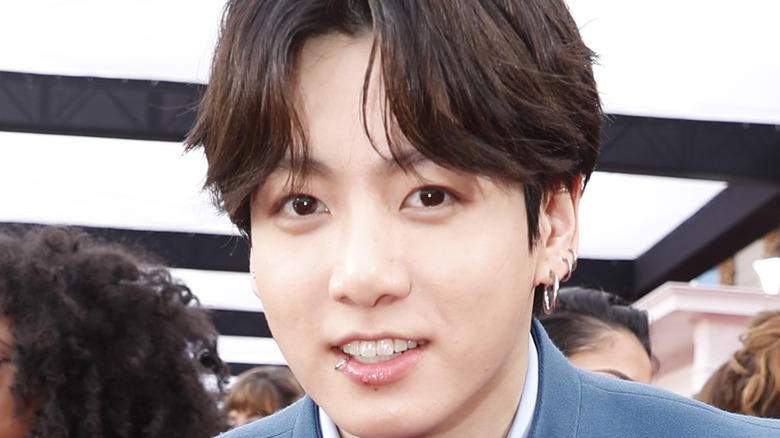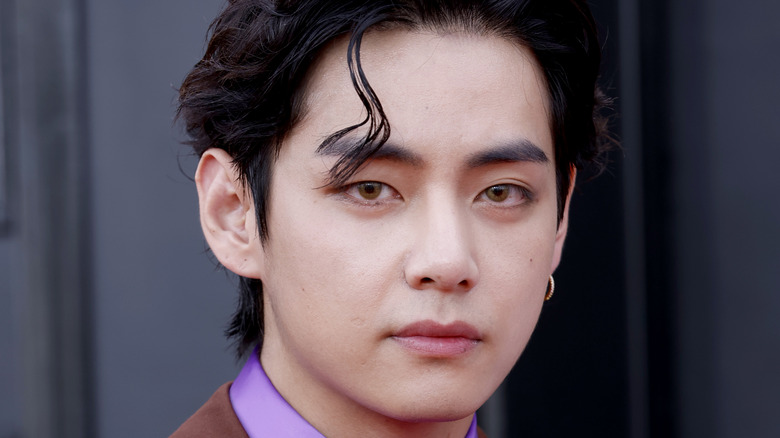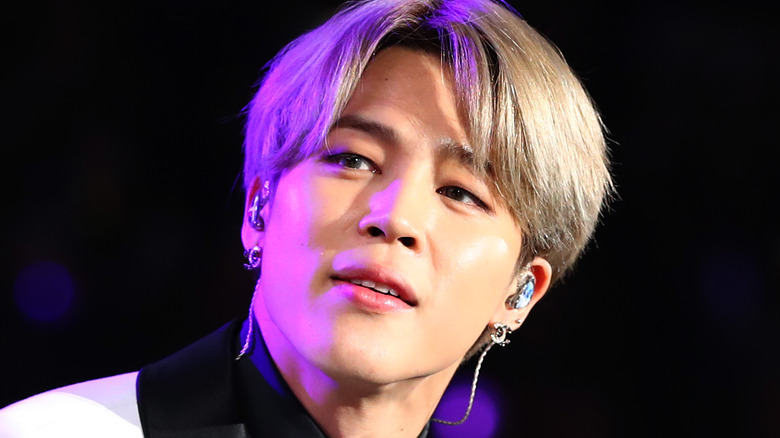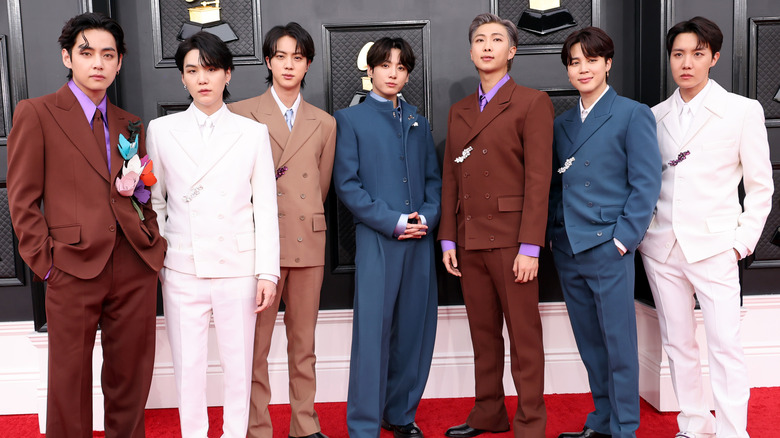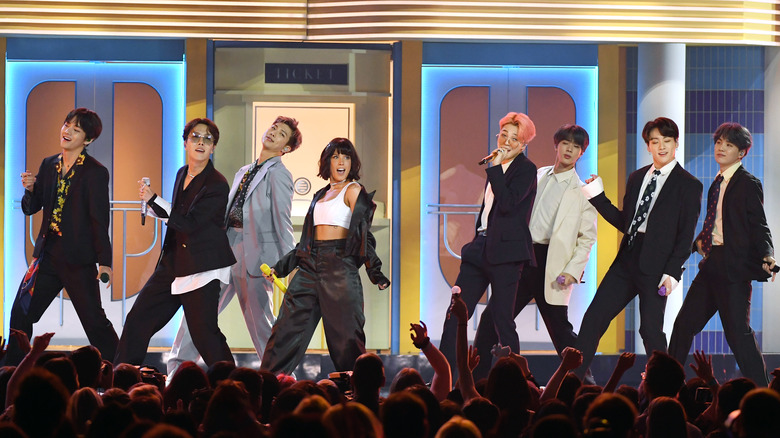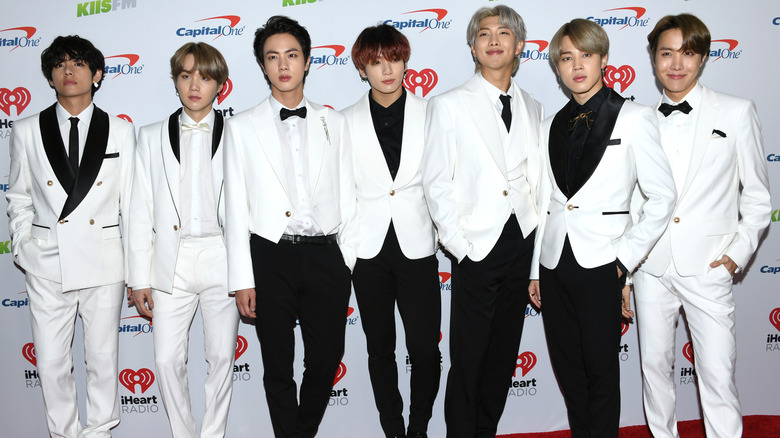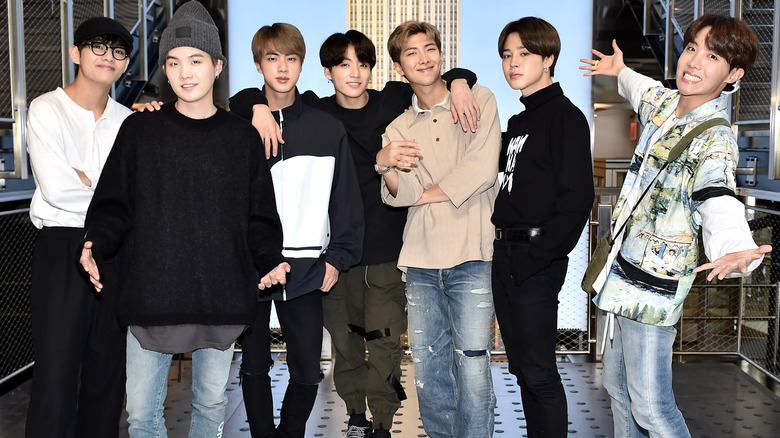Lesser Known Facts For Every Member Of The BTS ARMY
This article references racism, hate crimes, and disordered eating.
Korean music group, BTS (aka Bangtan Sonyeondan) has been a wild success since its debut in 2013. The boys' passion for creating music is arguably only rivaled by their love for their fans, who are called ARMY (aka Adorable Representative M.C. for Youth). Both BTS and ARMY are affectionately active in each other's lives. The seven members of the group are active on social media platforms worldwide, constantly providing insights into their daily experiences and broadcasting live video events with which to speak with ARMY about their hopes and dreams.
In return, the fan collective is equally devoted to their seven "Tannies," as they are affectionately called. The fans have been known to match $1 million fundraisers for causes close to the band's heart, as well as shower the group with praise and well-wishes whenever they can.
It may seem that BTS and ARMY know everything about each other, and in some ways, that's true. But there may be some facts about the "Tannies" that even the most vigilant of ARMY members may not know.
Their struggle was real early on
Despite their major success, BTS has not always been the most popular K-pop group on the block. In fact, they spent their early years proving themselves to their label, to their audience, and to themselves. Until 2016, the seven members shared one dorm room and one bathroom at their Big Hit Entertainment training facility. "In one room, there were three bunk beds and one normal bed," band member SUGA described on "The Tonight Show with Jimmy Fallon." "And in between them, there was space for just one person to walk through."
The group also had to promote its own concerts early on. The series "American Hustle Life" chronicled the budding stars spending time in Los Angeles, and showed the members handing out flyers on the street to promote attendance at one of their concerts.
They have faced their fair share of haters, too, both from audience BTS "antis" – people who publicly and openly hate the group – and within the industry itself. In a 2013 video, Korean rapper B-Free criticized BTS members and rappers, RM and SUGA, while they were sat right next to him. When the video went viral years later, B-Free released a statement on Twitter apologizing to both the group and to ARMY for how he treated the superstars in the past. Needless to say, fans were not accepting of the too-little-too-late apology.
SUGA faced parental scrutiny
Facing up to haters and harsh critiques from industry peers is one thing. But some BTS members have even faced scrutiny from their own families. SUGA, one of the lead rappers and producers of the group, had to cope with his parents' disapproval of his music career early on. "My parents didn't understand rap ... It wasn't part of the music that they listened to. So it's only natural they were against what I was doing," SUGA shared during a Rolling Stone interview. "... I think that motivated me or helped me work harder because there was something that I now had to prove. I had to show my parents it was possible."
However, it may not have been just a generational culture clash at the heart of his parent's disapproval of his career. As SUGA told Rolling Stone, being a musician doesn't exactly rank high on the list of stable career options, so he could totally understand why they weren't fully supportive of his professional aspirations. However, as the group continued to rise in popularity and prominence, eventually his mom and dad were able to come to terms with their son's profession. They even come to see and support him at concerts. Per The Indian Express, it was during one of these occasions that SUGA even broke down in tears and bowed deeply in respect to his parents.
J-Hope almost left the group for good
The trials and troubles facing BTS at the beginning of the young group's career also caused some doubt within the group itself. Member and dance leader, J-Hope, left the group early on to pursue a solo dancing career – a decision that prompted Jungkook to shed more than a few tears. According to Korea Crush, J-Hope was a parental figure to the youngest BTS member in the group's early trainee years, and the thought of Jungkook losing his hyung (meaning older brother) made him very upset.
The band recalled the emotional time during the third episode of YouTube Red's "Burn the Stage" documentary series, with J-Hope reflecting on his decision to return. "I came back because I trusted you guys," he explained. Meanwhile, RM shared, "I don't want to think what would have happened without [you]." The artist formerly known as Rap Monster also revealed that he worked hard to convince their label, Big Hit Entertainment, that J-Hope was an integral part of the group. In the documentary, he revealed "I told them we needed Jung Hoseok. We need Jung Hoseok, we can't make it without him. I worked really hard to convince them."
The tragic backstory behind Spring Day
Within their massive discography, there are several revered tunes that have special meaning to both BTS and ARMY. One of those songs is "Spring Day," an uplifting ballad from their 2017 album, "You Never Walk Alone." The acclaimed song serves a dual meaning for both the artist and their fans. On the one hand, the song's lyrics depict longing and deep love, with lines including, "How long do I have to wait and how many nights do I have to pass to see you? To meet you?" But beyond the initial meaning, the track also serves in remembrance of a South Korean tragedy.
In 2014, an overloaded ferry called the Sewol sank mid-voyage, and hundreds of people died, including 300 high school students on a sight-seeing trip. The incident was catastrophic across the country, and the government faced backlash over safety concerns from the public and from the media. While the group has never confirmed that the song was written about this specific event, eagle-eyed fans have been quick to point out poignant parts of the music video that seem to confirm the connection. When discussing the song with Esquire, Jin explained, "It is about a sad event ... but it is also about longing."
Released three years after the tragedy, "Spring Day" seemingly became a way for BTS and their young fans to express their grief as well as their yearning for closure.
So-called scandals have plagued the group
Celebrity scandals are always afoot in the press around the world, and BTS are not immune to this trend having faced a number of so-called "scandals." One of these controversies occurred in 2014 when Jin was spotted with a pack of condoms in his dorm room. Many South Korean idols are discouraged both personally and contractually from dating, so the photographic discovery sent fans into an uproar. This prompted the group's label, Big Hit Entertainment (now HYBE Entertainment), to release a statement saying that the condoms were a fan gift.
Some of the group's apparent scandals have been less about the person and more about the art they produce. In 2015, group leader RM, who is a lead rapper, producer, and songwriter for BTS, was accused of plagiarising lyrics from other people's tweets. He later owned up to the issue and took responsibility for his actions. "I get my inspiration from talking to friends, reading books I like, watching movies, interviews, and letters from fans," he shared in a statement on Twitter (via Digital Music News). "I realize I subconsciously made a mistake. I focused on simply writing the song without paying attention to finding out the true sources for my lines." Apologizing to fans, he added that he'd reach out to personally make amends with the original creator of the lines.
Youngest member Jungkook has made multiple headlines
Being the maknae (aka the youngest) of BTS has not made Jungkook immune from the headlines. The lead vocalist has been scrutinized for a number of incidents, including a car accident in 2019 where he struck a taxi cab. Per the BBC, according to a statement from Big Hit Entertainment, the collision thankfully didn't result in any major injuries. "The scene of the accident was resolved and police questioning was completed according to the due process, and an amicable settlement was made with the victim afterwards," the management company shared. "We once again apologize to the victim, and we also express apologies for causing concern to fans."
Jungkook and the label made another apology the next year after he was spotted at a club with his friends at the height of the COVID-19 pandemic. "We have no excuse that we placed the artist's personal life before we were able to emphasize the importance of social distancing," the statement read, per Reuters. "We bow our head in apology." But it wasn't just Jungkook in hot water. Several other K-pop stars were with him, including Cha Eun-woo of Astro, Mingyu of Seventeen, and Jaehyun of NCT. All of their respective managers released statements regarding their artists' involvement in the incident, particularly in the wake of rising cases of the virus at the time. Luckily, all of the friends tested negative for the illness after their night out.
V's personal life became a hot topic
BTS vocalist, V might be known for his deep, rich voice, but he's also been the topic of persistent romance rumors — and subsequent fan wars. In 2022, private photos were leaked of fellow K-pop idol and BLACKPINK member, Jennie, that allegedly included her and V in several photos together. Neither Jennie nor V nor their respective management companies, YG and Big Hit Entertainment, released statements confirming the identities in the photos.
As defamation is a criminal offense in South Korea, fans were quick to react online. Per Bollywood Life, while a war of words broke out between some members of ARMY and BLACKPINK's "Blinks," others banded together to defend their idols' privacy and lament the lack of action from their labels. Eventually, both companies filed criminal complaints and issued statements regarding legal proceedings.
While Big Hit hasn't specifically addressed V and Jennie's rumored romance, they have shared several legal updates regarding the group overall. In a statement shared by Billboard, the company stated that they remained attentive to any ill-intentioned postings against the band. "Our company regularly initiates legal proceedings against perpetrators of malicious activities related to BTS," the company shared. "... We would like to stress that we will continue to initiate strict measures to ensure that these malicious acts are not repeated, and our policy of no settlement and no leniency remains in effect."
Jimin maintained an extreme diet in the group's early days
To no one's surprise, pop stars and celebrities are generally kept to precise standards of beauty and body image. BTS vocalist and main dancer, Jimin, has likewise been subject to such scrutiny since his early days as an idol. In the group's "Wings" concept book (via Twitter), the star revealed that his intense diet and exercise regimen made him physically weak. "I think I was a lot more sensitive when I was dieting," he shared. "... The members [would look] at me with sympathetic expressions. Jin Hyung said 'Eat food with me. Why are you dieting to that extent?,' but I said 'No, I think I have to do this.' and continued regulating my diet."
Dubbed the "Jimin diet," the regiment reportedly entailed him eating only one meal per day for ten days. The BTS star opened up about his extreme dieting during that era on the JTBC program "Please Take Care of My Refrigerator" (via K!). "While looking at the mirror during our 'Blood, Sweat and Tears' practice, I wanted to become handsome," Jimin shared in the interview. "So I went on a diet where I survived off of one meal for 10 days. However, I learned to never diet like that again."
If you need help with an eating disorder, or know someone who is, help is available. Visit the National Eating Disorders Association website or contact NEDA's Live Helpline at 1-800-931-2237. You can also receive 24/7 Crisis Support via text (send NEDA to 741-741).
They faced rampant racism as their star rose
In 2022, BTS visited the White House to bring more awareness to a rise in anti-Asian hate crimes across the U.S. Just a year earlier, they'd taken to Twitter to show they stand tall in the presence of hatred in response to the Atlanta spa shootings against women of Asian descent. "We condemn violence," the band wrote. "You, I, and we all have the right to be respected. We will stand together." In the tweet, the band also outlined the racism they'd personally experienced, "We have endured expletives without reason and were mocked for the way we look," they wrote. "... These experiences were enough to make us feel powerless and chip away our self-esteem."
As noted by Forbes, as the group's star continued to rise, they also faced repeated jibes from media figures that many condemned for being racist. That included a German radio show host who compared the band to COVID-19 and suggested they should be eradicated with a vaccine. The radio station in question later apologized. Meanwhile, in the United States, an on-air staff member working on "The Howard Stern Show" similarly caught heat after suggesting he was scared of catching the virus from BTS when they visited their building at the start of the pandemic. Even noted germaphobe and former shock jock, Howard Stern, stepped in to tell the guy, "I'm super paranoid about diseases and germs, but you came off as racist."
If you or a loved one has experienced a hate crime, contact the VictimConnect Hotline by phone at 1-855-4-VICTIM or by chat for more information or assistance in locating services to help. If you or a loved one are in immediate danger, call 911.
Relationships with Western artists have divided fans
Over the years, BTS have collaborated with a wide variety of artists, producers and content creators. Many of these artists are popular Western artists, adding stake to BTS' already significant claim on the global music charts. The boys have worked with a number of popular acts, like Halsey on "Boy with Luv," Steve Aoki on "Mic Drop (Steve Aoki Remix)," and Coldplay on "My Universe." These artists, and many more, have spoken openly about their relationship with and admiration for the group. In 2017, for instance, Halsey wrote a glowing tribute to BTS when they were included in Time magazine's prestigious 100 Most Influential People list. "Behind those three letters are seven astounding young men who believe that music is stronger than the barriers of language," they wrote. "It's a universal dialect."
Meanwhile, some artists have been accused of having an agenda behind their collaborations. For instance, after Charlie Puth performed a duet with Jungkook at the 2018 MGA (MBC Plus X Genie Music Awards), he was accused of having used the BTS star to bump up his own career. Two years later, the American singer-songwriter responded to the claims on Twitter. "It doesn't really mean anything to me when some person I don't know writes a nasty message to me saying things like 'I used BTS for clout.' I don't know what that means — I love those guys and they are super talented." In 2022, Jungkook joined Puth for an official duet titled, "Left and Right."
Their label was once sued for copyright infringement
BTS's label HYBE Entertainment (formerly Big Hit Entertainment) has been the subject of several high-profile lawsuits. In 2021, the company was sued for copyright infringement over a reality show titled, "I-Land," which featured young idol trainees vying for a spot in a new K-pop band the label was producing. In the suit, the plaintiff, a Florida man named Bryan Kahn, claimed that HYBE and producing partner CJ E&M America based "I-LAND" off of his show "Island Hip Hopping," which had officially been in development since 2013. By 2022, the lawsuit was dismissed in favor of HYBE Entertainment and CJ E&M, with a judge ruling that there was insufficient similarity between the protected elements of both properties.
On the upside, "I-Land" eventually produced the group ENHYPEN, with BTS making an appearance in the finale as mentors to the contestants. The new boy band were clearly listening as they enjoyed significant success within their first year of being active. Per Forbes, the group has continued an impressive ascent to global superstardom as of this writing.
They had to cancel their world tour
In March 2020, BTS was preparing for the biggest era of their career. After releasing their album, "Map of the Soul: 7," the group announced a worldwide stadium tour, due to begin in April 2020. Sadly, the band were forced to cancel all dates due to the uncertainty surrounding COVID-19, seemingly hitting the brakes on the biggest era of the band to date. In a statement published by SBS, HYBE Entertainment stated that they would still be working on future plans for a rescheduled tour. "We will also create new ways for our artists to engage with their fans and respond to the 'New normal' while we wait to resume activities halted by COVID-19," they shared.
What did BTS do in the meantime? They made more music. In August 2020, they released their first full English-language song, "Dynamite." Within 24 hours of its release, the track broke multiple records in YouTube views and song streams. It also earned the group its very first Grammy nomination. "[The inspiration for] it all began ... in the midst of hardships," the group shared with the Grammy Awards. "We hope people feel energized when listening to the song,"
The group has continued its professional ascent uphill ever since. As of 2022, the septet had released even more music, sold out residencies at stadiums in Los Angeles and Las Vegas, and was nominated for a second Grammy in 2021.

